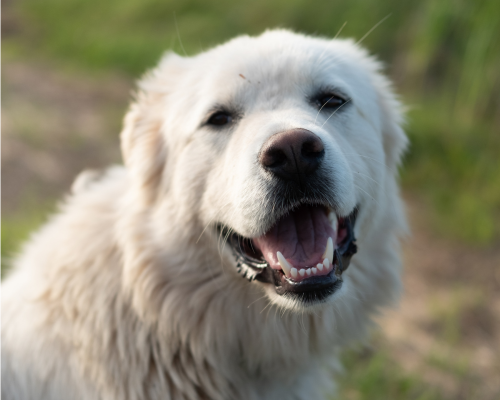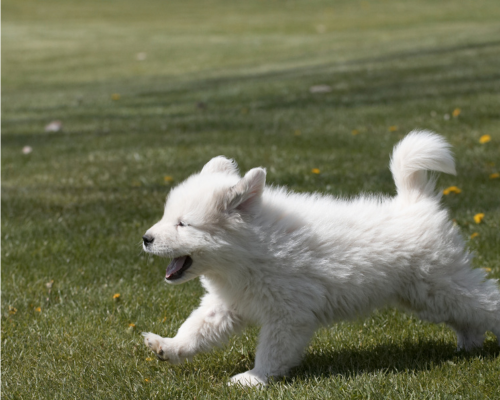Why Does My Great Pyrenees Growl at Me? Need To Know!
Why Does My Great Pyrenees Growl at Me? Need To Know!

Vet Reviewed

By: Sarah Hodgson
January 1, 2024
Table of Contents
If you are an owner of a Great Pyrenees, you may have been in a situation where they growl at you even though you did nothing wrong to them. This behavior might not only confuse you but also stress you out.
In this article, we will explore the reasons why your Great Pyrenees may be growling at you, and how you can effectively address this behavior.
So, let's dive in!
Reasons Why Great Pyrenees Growl At You
Now, every dog is different and there isn't one reason for every situation out there. So below we listed the most common and unusual reasons why they might be growling at you.
They Are Trying to Communicate
One of the primary reasons why your Great Pyrenees may growl at you is because they are trying to communicate something. Dogs have a limited range of vocalizations, and growling is one of the ways they express their feelings. It's essential to pay attention to the context in which the growling occurs. Is your dog growling during playtime, when they are scared, or when they are in pain? Understanding the underlying message your dog is trying to convey can help you respond appropriately.
Territorial Behavior
Great Pyrenees are known for their protective nature, and growling can be a sign of territorial behavior. This breed was initially bred to guard livestock and their territory, so it's not uncommon for them to exhibit this instinct in a domestic setting. If your Great Pyrenees growls when someone approaches your home or property, it is likely their way of warning potential intruders. While it's essential to respect your dog's protective instincts, it's also crucial to provide them with proper training and socialization to ensure their behavior is appropriate.

They Have Pain or Discomfort
Growling can also be a response to pain or discomfort. Dogs, like humans, may growl when they are in physical distress. If your Great Pyrenees growls when you touch a specific area of their body or during certain movements, it is crucial to observe their behavior and consider seeking veterinary attention. Pain or discomfort can cause dogs to become defensive and growl as a means of protecting themselves.
Consulting with a veterinarian will help identify and address any underlying health issues that may be causing your dog's growling.
They Want To Play
Sometimes, your Great Pyrenees may growl during playtime. This growling is often accompanied by wagging tails, relaxed body language, and a playful demeanor. It's important to differentiate between play growling and aggressive growling. Play growling is a natural behavior in dogs and is their way of expressing excitement and enjoyment. If the growling is accompanied by other playful behaviors and your dog is responsive to your cues, there is no cause for concern. However, if the growling escalates into aggressive behavior, it's crucial to intervene and redirect their attention to more appropriate play.
They Want Something You Have
Another reason why your Great Pyrenees may growl at you is that they want something you have. Whether it's a treat, a toy, or even your attention, growling can be their way of asserting their desire. This behavior is often seen when dogs feel their resources are being threatened or taken away. It's important to set clear boundaries and establish rules regarding resource guarding. By providing consistent training and reinforcing positive behavior, you can teach your Great Pyrenees that growling is not an effective means of communication when they want something.
Natural Protective Behavior
Great Pyrenees have a natural instinct to protect their loved ones, including their human family members. In some cases, growling can be a manifestation of their protective nature. If your Great Pyrenees growls when someone approaches you, it may be their way of ensuring your safety. While it's important to appreciate their protective instincts, it's equally vital to teach them appropriate behavior.
Socialization, obedience training, and positive reinforcement can help channel their protective nature in a controlled and balanced manner.

They Are Scared
Fear is another common trigger for growling in dogs, including the Great Pyrenees. When dogs feel threatened or scared, they may resort to growling as a defense mechanism. It's crucial to identify the source of your dog's fear and work on desensitization and counter-conditioning techniques to help them overcome their fears.
Showing Affection
Believe it or not, growling can sometimes be a sign of affection in dogs. Some Great Pyrenees may growl softly when they are content and feel loved. This growling is often accompanied by relaxed body language, gentle nudges, and a wagging tail. It's important to observe your dog's overall behavior and body language to determine whether their growling is a sign of affection. If your Great Pyrenees displays other signs of happiness and relaxation while growling, there is no need for concern.
They Want Attention
Just like humans, dogs crave attention and interaction. If your Great Pyrenees growls at you, it may be their way of seeking your attention. This behavior is often seen when they feel neglected or want to engage in play or activities. It's crucial to establish a routine that includes regular exercise, mental stimulation, and quality bonding time with your Great Pyrenees.
Should I be Worried If My Great Pyrenees Growls at Me?
Now that you figured out the reason should you be worried?
If your Great Pyrenees growls infrequently and in appropriate situations, there is likely no reason to be concerned. It is completely normal for this type of breed to growl.
However, if the growling becomes more frequent, escalates into aggression, or is accompanied by other concerning behaviors, you might need to consult with a professional dog trainer or behaviorist.
Do Great Pyrenees Growl a Lot?
If you are a Great Pyrenees owner you should expect some growling as this breed growls a lot. However, it's completely normal and there is no need to be worried as we mentioned earlier.
Should I Yell at my Great Pyrenees if he Growls?
Never yell at your dog! Yelling or punishing your Great Pyrenees for growling is not recommended.
Growling is a natural form of communication for dogs, and punishing them for expressing their feelings can create fear and anxiety. Instead, it's important to focus on positive reinforcement and reward-based training. By teaching your Great Pyrenees alternative behaviors and providing positive experiences, you can help them feel more comfortable and confident, reducing the need for growling as a means of communication.

How Can I Stop My Great Pyrenees From Growling at Me?
To say it simply, it is nearly impossible to stop their growling as it is a natural instinct in most cases. Just like us, humans raise our voices naturally and we can't stop that the same can be said for a Great Pyrenees growl.
However, you can distract them from growling, and that will limit the frequency of their growls. Here are some strategies you can use.
- Proper Socialization: Introduce your Great Pyrenees to various environments, people, and animals from a young age. This will help them become more comfortable and less likely to growl out of fear or anxiety.
- Positive Reinforcement Training: Reward your Great Pyrenees for desired behaviors and redirect their attention when they growl inappropriately. Consistency and patience are key to successful training.
- Consult a Professional: If your Great Pyrenees' growling persists or escalates, it's advisable to seek guidance from a professional dog trainer or behaviorist. They can provide tailored strategies and support to address the specific needs of your dog.
The Bottom Line
So there you have it, growling is a natural form of communication for Great Pyrenees. Understanding the reason why your Great Pyrenees may growl at you is super important for understanding the underlying cause.
Note
Remember, growling is just one way your Great Pyrenees might be expressing their feelings. With patience and understanding, you can navigate this behavior and strengthen your bond with your dog by understanding their ways of communication.

Subscribe to Petfluence!
Get updates on the latest posts and more from Petfluence straight to your inbox.